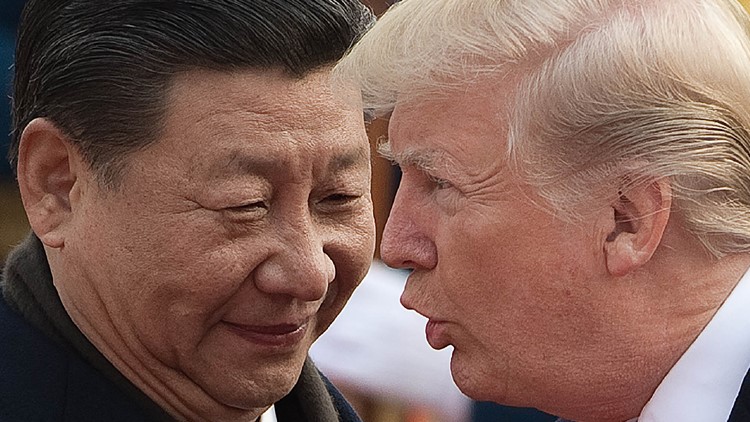Washington leaders are expressing bipartisan concern to President Donald Trump’s announcement of tariffs on Chinese goods, a move triggering fears of a potential trade war between the countries with the two biggest economies.
Washington state, among the most trade dependent states in the nation, also counts China as its largest trading partner for both imports and exports. Last year, Washington exported more than $18 billion in goods to China, according to U.S. trade data, with airplanes and wheat among the top exports.
“I am concerned about the impact the Trump administration’s tariffs on Chinese imports will have on our businesses and consumers,” said Governor Jay Inslee in a statement to KING 5.
President Trump, meanwhile, blasted the country’s trade imbalance with China and says the measures are designed to punish China for theft of American companies’ intellectual property.
"We're gonna get it taken care of, and frankly, it's gonna make us a much stronger, much richer nation," President Trump said Thursday.
“The issue of Chinese piracy is a real issue, and we need to deal with it, but I don't think this is going to accomplish that objective,” said former Republican gubernatorial candidate Bill Bryant, whose firm Bryant Christie works with U.S. exporters. “You're going to raise the price on cell phones, tennis shoes. The American consumer is going to pay a higher price.”
The U.S. Trade Representative’s office will release a list within 15 days of proposed products that could face the higher tariffs.
Experts caution it’s too early to know the full scope of potential impact, but Bryant and others worry about retaliation.
“China is not going to take this lying down,” said Bryant. “They’re going to retaliate, and so yeah, if you’re exporting airplanes, or you’re exporting wheat, apples or seafood, any number of manufactured technology products, you should be concerned.”
China’s embassy in a statement late Thursday only intensified fears, reading in part, “China is not afraid of and will not recoil from a trade war.
“China would fight to the end to defend its own legitimate interests with all necessary measures,” the statement continued.
By Thursday evening in the United States, China’s commerce ministry proposed a list of 128 U.S. products that could become potential retaliation targets, including pork, wine, fresh fruit, steel and recycled aluminum goods.
“This is how trade wars begin, and the effects for Washington are real. We export more per capita than any other state, and therefore stand to lose the most in the event of a trade war,” said Lt. Governor Cyrus Habib in a statement Thursday.
“Particularly concerning are the 15% tariffs on fruit and wine, two critical Washington state commodities,” Habib continued referencing the proposed reciprocal tariffs announced by China.
Former Washington Governor Gary Locke, who also served as U.S. Ambassador to China, fears what it might mean for Boeing, which he says exports one-third of its planes to China.
"A lot of those orders that are going to Chinese airlines will be given to Airbus. And so we're going to see a long term decline in the sales of Boeing airplanes which means less workers which means less jobs in the Puget Sound area," Locke said.
Bill Bryant also worries about the ancillary impact to port and transportation jobs if tariffs result in a decline in trade.
“We need to deal with Chinese piracy but we need to do it in a way that actually targets the problem, not imposes harm on people in Washington state, and certainly not in a way that costs people in Washington state their jobs,” he said.
More reaction to Thursday’s announcement:
Rep. Dave Reichert, R-Washington, chairman of subcommittee on trade:
“I share the same goal of protecting the technology and intellectual property of American companies, but we must pursue a strategy that targets the problem and protects American families and workers. A strategy that doesn’t put an end to the problem, but harms American families and businesses, is not the right answer. A successful strategy requires a narrow approach and a global partnership to address China’s unfair practices. If we don’t apply the right remedy, it is Americans who will bear the brunt, not China,” Reichert said in a statement.
Senator Maria Cantwell, D-Washington
“I want a more sophisticated approach to address trade disputes with China,” Cantwell said in a tweet. “I get that a kind of stomp-your-feet approach makes some people feel good, but in the integrated economy that we already have, it’s more complex.”
Paul Guppy of the Washington Policy Center
“The U.S. and Washington state gain from trade with other countries, but if trade deals aren’t fair they need to be re-balanced. If research shows China is taking advantage of U.S. firms, or using business partnerships to steal U.S. technology, Trumps tariff policy sends a positive signal that should lead to a negotiate solution, but he should carry the policy so far that it sparks a trade war with one of our largest trading partners,” said Guppy.
Dr. Richard Ellings of the National Bureau of Asian Research and executive director of the IP Commission:
"The administration is acting to protect American interests in the face of coordinated political and commercial pressure from China to take the intellectual property of American companies and force their transfer of technology," said Dr. Ellings. "Our system must respond as an integrated whole to this challenge, and so charging the secretary of the Treasury to limit Chinese investment in the U.S. economy where it runs counter to American national security interests is a good first step."
Brian Kelly, Economics Professor at Seattle University, previously worked for U.S. Department of Commerce
"China does pressure companies to give up their intellectual property and this is a problem. But this needs to be addressed as a team effort with our allies in direct, forceful negotiation. Going straight to retaliation - the tariffs - will not cause China to change its behavior. In doing so, we give up one of our negotiating levers, just as we did in withdrawing from the TPP, without getting anything from China in return," said Kelly.
"In my experience, China retaliates. I think that they will wait to see what the White House ends up actually proposing. Perhaps, like the steel and aluminum tariffs, the actual policy will be watered down a lot, which China may view as a sufficient victory. But if the tariffs are as substantial as promised, I think that China will try to hit the us in areas where it has leverage, such as agriculture or services," Kelly continued.



